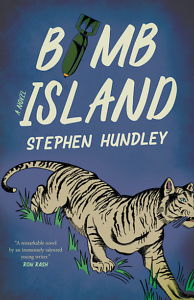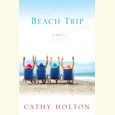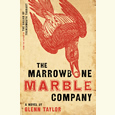Troubled Paradise
Stephen Hundley’s Bomb Island explores a 14-year-old boy’s dangerous coming of age
Stephen Hundley, author of the story collection The Aliens Will Come to Georgia First, continues the theme of writing about Georgia in his debut novel, Bomb Island. Filled to the brim with quirky characters with even quirkier names — and, yes, an actual bomb — as well as a live tiger, Bomb Island does not disappoint when it comes to creating tense situations. In fact, it opens with a close encounter between Fish, the main character, and the tiger, whose name is Sugar. But before delving into that, an introduction to the cast is in order.

Fish is a 14-year-old boy whose house in Atlanta caught fire when he was a child. His mother Sara moved him out to Bomb Island, a three-mile stretch of sand off the coast of fictional Royals, Georgia, where they joined a commune. The island’s name comes from an unexploded bomb that was accidentally dropped offshore in the 1950s and remains in the water, exploited as a tourist attraction.
Fish’s mother is now gone, and most of the original community has dwindled or left the island to return to a different, less primitive way of living. Whistle, an old woman known as the “mother-sage,” is the organizer of the commune and perhaps the only member who still believes in its power. The only other people living full-time on the island are Nutzo, an old man who is missing, and Reef, a younger man who occasionally acts as a father figure to Fish.
The mainland town of Royals is seen by Reef’s girlfriend, Darlin, as “a shrunken, possibly evil place. No one was from Royals. It seemed that people only fell there from some other, higher place.” Darlin has been illegally living in her grandfather’s house in Royals, but she’s ready to move. She hopes Reef will go with her to Atlanta. The novel’s only other primary character is Celia, a teenager a few years older than Fish who is staying with her father, Derbier, in Royals before she’s set to return to her mom’s house in Savannah.
Whistle is responsible for bringing the tiger to Bomb Island. Sugar was cute and relatively harmless as a cub but is now terrorizing the local wild horses and other wildlife. The big cat is also getting a little too rough with human residents, especially Fish. In the novel’s first scene, a group of horses drive Sugar into the water and Fish intervenes on the tiger’s behalf, only to have Sugar tackle and terrorize him immediately afterward:
“Sugar, stop!” Fish punched the tiger beneath its ear as hard as he could, but it didn’t budge. He pulled at his leg, but Sugar had hold of him. He was alone on the beach. His family was a mile away at camp.
Fear got into Fish. He jerked his knee and screamed at the tiger. Sugar dragged him across the sand. When he felt the tiger’s claws tear across his calf, Fish cried out and dug his fingers into Sugar’s face. He felt the large eyeball squish beneath his thumb, and the cat recoiled.
 Fish wants to spend his life on Bomb Island, comfortable with Whistle and Reef for parents, but Sugar is becoming an intolerable threat, and when Fish gets involved with Celia, Derbier — who previously only verbally taunted Whistle — takes matters into his own hands to address what he sees as a squatting problem. He boats out to the island equipped with a rifle and a determination to rid the place of vermin, both human and animal.
Fish wants to spend his life on Bomb Island, comfortable with Whistle and Reef for parents, but Sugar is becoming an intolerable threat, and when Fish gets involved with Celia, Derbier — who previously only verbally taunted Whistle — takes matters into his own hands to address what he sees as a squatting problem. He boats out to the island equipped with a rifle and a determination to rid the place of vermin, both human and animal.
Bomb Island is divided into three parts and is written in a limited third-person point of view. Fish is the primary narrator in part one, but as the novel progresses, we also get chapters from the perspectives of Reef, Celia, Darlin, and Derbier. These chapters provide insight and an adult point of view on the Bomb Island commune, and they also flesh out plot information for relevant parts of the story where Fish is not present.
After capturing the reader’s attention with the opening skirmish between Fish and Sugar, the novel’s pacing continues to pick up with each staggered revelation of an uncomfortable truth. As more disturbing details arise, the characters experience increasingly dangerous and desperate survival situations. Readers will find themselves turning the pages in rapt horror at the heartbreaking challenges Fish and his community are forced to face as they confront Derbier, Sugar, and the reality of living isolated from humanity.

Abby N. Lewis is from Dandridge, Tennessee. She is the author of the poetry collection Reticent, the chapbook This Fluid Journey, and the newest chapbook Palm Up, Fingers Curled from Plan B Press.


